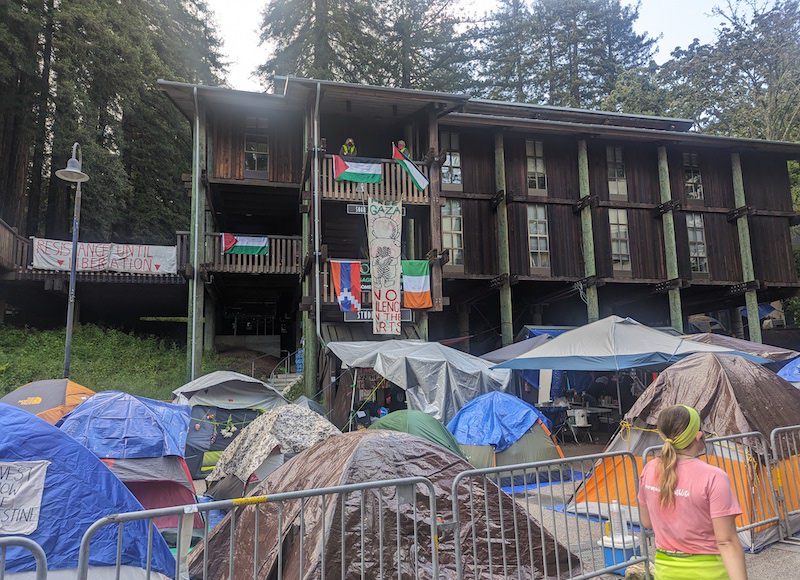After a late spring rain storm hit the area over the weekend, UC Santa Cruz students continued their protest of the Israel-Gaza war, occupying the University’s Quarry Plaza in an action meant to pressure the school into divesting from companies tied to Israel and U.S. weapons manufacturers.
The encampment sprung up May 1 and is being led by Students for Justice in Palestine at UC Santa Cruz (UCSC SJP), the local chapter of a larger network with a presence on college campuses across North America. The organization was founded at UC Berkeley in 1993.
Laaila, a second-year student and media liaison for UCSC SJP, said the encampment is an “amplification” of what SJP chapters across the nation have been doing for months, heeding the call from the national leadership of the organization.
“Part of that call was to encamp, to disrupt the daily lives of students and the campus and administration,” Laaila said.
The encampment is made up of mostly UCSC students.
Some U.S. politicians, university administrators and Jewish leaders have characterized the student protests as antisemitic. One of the demands on the group’s Instagram page asks that the University boycott Jewish groups such as “study abroad programs, fellowships, seminars, research collaborations, and universities. Cut ties with the Hellen Diller foundation, Koret foundation, Israel institute, and Hillel International.”
Hillel, represented at many colleges, is a Jewish educational, cultural, and social program for all students. The other organizations support Jewish life and Israel, similar to the NAACP or other organizations supporting minority rights.
Santa Cruz Hillel, in an Instagram post, had a nuanced response to the protest.
“We respect the students’ right to protest about causes they care deeply about and know Jewish students on campus have different feelings regarding this protest,” read part of the statement.
“Hillel’s motto is ‘all kinds of Jewish’ and we support all our Jewish students, now and in the future, while also expecting respect for one another, even when stakes are high and feelings are passionate,” the statement concluded.
The Israel-Gaza war is entering its seventh month, spurred on after Hamas militants led an attack on Israel’s southern border on Oct. 7. Around 1,200 Israelis and foreigners were killed that day, according to Israeli numbers. Hamas also took 250 hostages. The ensuing bombing campaign and incursion into the Gaza Strip by Israel has killed over 34,000 people, according to the Gaza Health Ministry.
Demonstrations have been held around the world against the Israeli response and the calls to boycott companies and institutions linked to Israel have increased. The core demands of many of the nationwide university protests have included divestment from Israel.
The student protests have been highly organized with support from various groups, including SJP and UC Divest.
UCSC SJP put out a statement on its social media accounts with a list of demands for University administration. Among them are calls for the “complete divestment from weapon-manufacturing companies and research collaborations with weapon manufacturing industries, including passive and active investment Blackrock,” according to the statement.
Blackrock Inc. is a multinational investment company and asset manager that handles investments for the University of California. The firm has a seven percent ownership stake in Lockheed Martin, an aerospace, arms, defense, information security and technology corporation which operates a facility in Bonny Doon.
Lockheed Martin has ongoing contracts with the U.S. military as well as the Israeli military, which was the first to acquire the company’s fifth-generation F-35 fighter jet.
The scene over the weekend at UCSC was starkly different from the chaotic images broadcast from Columbia University, UT Austin, UCLA and other campuses in the last weeks, as police in riot gear dispersed similar protests. There was no police presence observed at UCSC by this reporter.
Protestors allege that the University administration has installed surveillance cameras above the Bay Tree Bookstore to monitor the encampment.
Dozens of tents dotted the narrow passageway of Quarry Plaza as around 50 individuals—most wearing masks or face coverings—engaged in “de-escalation training” near the entrance to the plaza, led by a protester yelling instructions into a bullhorn.
Others milled around the encampment or remained inside tents, surrounded by Palestinian flags hanging above them off the wooden railings of the Student Union building. Organizers estimate that the number of protestors has reached close to 100 at times.
Laaila said that UCSC SJP has been in communication with University administrators and that the protestors have been asked to adhere to fire code regulations.
“We’ve been mostly adhering to [the regulations], but since we are growing they are expecting more and more from us,” she said.
Protestors at the Quarry Plaza are preparing for when the encampment is also dismantled.
“We know that they’ll eventually shut us down and we’re preparing for that, but this has been such a lovely community as well. We’re all here for the same thing, divestment. We’re all here for the anti-war movement,” Laaila said.
Some have interpreted the student protests against the war in Israel-Palestine as anti-Jewish, pointing to the rise in anti-Zionism on campus as equivalent to antisemitism.
Laaila noted that some counter protestors had made their way up to the encampment during the first nights of the occupation, and proceeded to take photos and video of the Quarry protestors. She also alleged that other counter protesters blared horns and revved the engines of their vehicles in the middle of the night.
Chabad on Campus at UCSC, an organization that serves as a “home away from home” to Jewish students, according to its website, sent out an email to students and affiliates on May 3 denouncing the Quarry encampment.
“It is heartbreaking to see the chaos and animosity brewing in the center of campus, and what’s worse, it is being disguised as or conflated with some form of social justice,” said the statement signed by Rabbi Shlomie Chein and Devorah Leah Chein, the director and executive vice president, respectively.
The demands that UCSC SJP listed in its social media statement have also been characterized as antisemitic.
An Instagram account with the handle antisemitismtoday, which reports “antisemitism in the news and social media,” according to its page description, shared a post to its page last weekend referencing UCSC SJP’s demand for the academic boycott. The account has nearly 64,000 followers.
“This isn’t about Israel. This is about purging Jews from campus,” read part of the post.
In response to these and other similar allegations, Laaila said she invites the community to come to the Quarry Plaza, meet the protestors, and see that they are not promoting hate. She notes that there are many Jewish students within the encampment.
“It is so devastating to hear these types of quotes without people understanding why we’re out here,” Laaila said.
University spokesperson Scott Jason-Hernandez in an email statement did not directly respond to specific questions regarding coordination with police to dismantle the encampment, nor about the administration’s communication with the protestors.
“The continued safety and well-being of our students and employees remains our highest priority. We also continue to support free expression while ensuring that our teaching and research mission continues unabated,” Jason-Hernandez said.
The University currently has no plans to cancel its commencement ceremonies, which will be held from June 14 to 17. Columbia, USC and Emory University have all canceled their graduation ceremonies due to the protests. An author interview with Hernan Diaz on May 19 at the Quarry Amphitheatre has been moved to avoid conflict with the demonstration. The new location hasn’t been announced yet.















How disappointing that this article did not provide much context for the protesters’ cause. To be clear, the government of Israel has for decades imposed a system comparable to Apartheid-era South Africa or the Jim Crow-era American south, in which Palestinians are systematically denied equal rights and representation. Palestinians are subject to a separate justice system devoid of the civil rights and due process entitled to Israeli citizens. In Gaza, Israel has enforced an embargo since 2007 as collective punishment for Hamas’s electoral victory in the territory. This embargo has intentionally strangled Gaza’s economy and closed its borders, turning an area less than a third of the size of Los Angeles into an open-air prison.
Most recently, Israel has waged a brutal war of revenge, committing numerous war crimes, including the mass-casualty bombings of civilian centers, hospitals, schools, places of worship, and even refugee camps. Israel’s military has committed massacres and carried out summary executions, burying the dead in mass graves. Israel has weaponized starvation, cutting off supplies of food and medicine and killing aid workers. So far, over 35,000 Palestinians have been killed, including 14,500 children. Man-made famine threatens to kill many thousands more.
The protesters see a powerful, nuclear-armed nation with the full backing of the United States brutalizing a much weaker opponent–not a rival nation, but a territory occupied by Israel itself. They hear credible charges of ethnic cleansing and genocide committed against the Palestinian people. Their empathy for their fellow men, women and children is to be praised. They are setting an example for our own leaders.